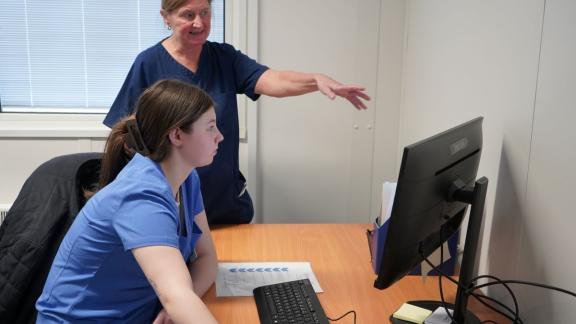T Level talent boosts patient care at York CDC

Overview
Askham Bar Community Diagnostic Centre (CDC) in York, works with Nimbuscare to provide a range of diagnostic tests and scans in a community-based setting.
The CDC partnered with York College to host T Level students, creating a supportive learning environment while enhancing patient care. Students gained hands-on experience with diagnostic procedures and administrative tasks, contributing to smoother operations and improved patient experiences.
The placements also benefited staff by enabling a culture of mentoring and knowledge sharing.
Key benefits and outcomes
- Students supported both clinical and administrative tasks, easing pressure on staff and improving workflow.
- Mentoring students encouraged staff to grow their teaching and leadership skills, fostering a learning culture.
- Exposure to real healthcare settings helped students make informed decisions about their future, with some pursuing nursing degrees.
- Students applied their T Level knowledge in infection control, data entry and assessments, enhancing overall team performance.
- The success of the industry placements led to programme expansion, helping to build a future ready workforce.
What the organisation faced
When York College approached the CDC with a request to host Health T Level students, the staff initially felt apprehensive due to their lack of prior experience with industry placements. However, the college’s comprehensive pre-placement preparations provided the reassurance and structure needed to confidently welcome the students into the clinical environment.
What the organisation did
Before the industry placement, the college organised DBS checks for the students. The T Level students also had a thorough induction that covered both Nimbuscare and CDC policies, procedures and a confidentiality agreement. An industry placement agreement outlined the roles and responsibilities of everyone involved, alongside the student’s learning goals. This made sure that everyone knew exactly what was expected of them from the start.
A mentor from the host organisation was assigned to each student. Both mentor and T Level student were also supported by a reviewer from the college. A meeting with the college reviewer, mentor and student took place at least three times a year. This makes sure the student’s progress is monitored and the mentor is supported. As part of the reviews, all three renegotiate the student’s learning outcomes based on how they have developed, and on their goals and ambitions.
At the beginning of their industry placements, the T Level students observed and shadowed staff members. Then they gradually took on more active roles and used their technical knowledge to help with tests, such as ECG’s, ambulatory blood pressure monitoring (ABPM), ultrasound and spirometry.
Results and benefits
The team quickly recognised the benefits of hosting T Level students at the CDC. The industry placements not only helped the students, but also the staff working with them, creating a knowledge-sharing culture and encouraging staff to embrace their mentoring and teaching skills.
The T Level students thrived during their industry placements, gaining valuable hands-on experience that strengthened both their technical abilities and their understanding of career pathways within healthcare. Exposure to a wide range of roles and responsibilities helped broaden their awareness of opportunities they might not have previously considered. The CDC’s first T Level student was inspired to pursue a career in nursing and received four university offers.
In addition to the long-term benefit of developing future healthcare professionals, the CDC saw an immediate boost in team capacity. T Level students supported reception duties, recorded physiological measurements and assisted with patient care. Their existing knowledge in areas like infection control, data management, and clinical assessments allowed them to contribute meaningfully from the outset, improving overall team efficiency.
“T Level students gain hands-on experience with medical equipment and techniques essential for accurate diagnosis. These skills not only prepare T Level students for their future careers but also contribute to communication and relationships with patients and staff”.
Melanie Carter, Clinical Manager and Educator, Nimbuscare
Takeaway tips
• T Level industry placements can create a learning culture that enriches the culture of a department and encourages staff to develop their mentoring and teaching skills.
• Get T Level students involved in clinical practices, for example, recording blood pressures, ECGs and helping with breathing tests. This hands-on experience is crucial for developing their clinical skills.
• Giving students administrative tasks, including reception duties and data entry, helps them understand the administrative aspects of healthcare but it also means they can contribute positively to the team.
For more information about this case study, email Melanie Carter or Theresa Ollerenshaw, clinical manager/educator at Nimbuscare, York



